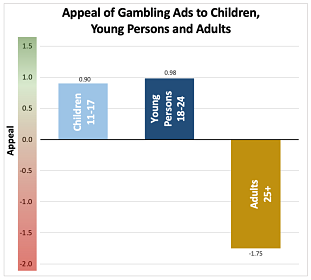What are the odds? The appeal of gambling adverts to children and young persons on twitter

The Gambling Act 2005 deregulated the gambling market in Great Britain and opened the door to advertising for sports betting and online casinos. 16 years later, more 16-34-year-olds gamble than any other age group and 55,000 children aged 15 and under have a gambling addiction.
Advertising has a part to play in this. Advertising codes state that, “Gambling marketing must not be of particular appeal to children and young persons.” Adults in the Advertising Standards Authority´s (ASA) enforcement team judge which ads appeal to children and thus break the rules. However, to date no one has asked children or young persons which aspects of gambling adverts appeal to them.
This research was carried out in form of an online survey with 210 children (11-17-year-old); 222 young persons (18-24-year-old); and 221 adults (25-78-year-old). By using a pictorial emotion measurement , it investigates for the very first time whether gambling advertising appeals more to children and young persons or to adults, and which emotions gambling adverts elicit. We chose to study Twitter advertising as social media advertising is particularly problematic.
Policy implications
Recommendations for regulators:
• Ban all esports gambling advertising. Esports gambling adverts are considerably more appealing to children and young people than to older adults. As most esports fans are under 30 any advert related to esports – including gambling – has an almost inherent appeal to children and young people.
• Clarify and tighten regulations for content marketing. We recommend that all content marketing ads are clearly labelled to signal to users that this is commercial content. New, strict regulations for content marketing must be introduced.
• Ask children and young persons directly and frequently what appeals to them. To date, regulators have never asked children and young persons what features of gambling advertising appeal to them. This must happen immediately and be ongoing.
• Use the answers from children and young persons to clearly articulate what advertising features should not be allowed in gambling advertising.
• Expand the definition of “young persons” in the advertising codes from 16-17 to 16-24. 18-24-year-olds found gambling adverts more appealing than other age groups and are most vulnerable to developing gambling addiction.
Recommendations for social media platforms:
• Social media companies should use tools to ensure that people only see gambling ads when they opt in. This could be done by using a Sensitive Content tool, where users only see an ad after confirming that they recognise it as advertising and want to see it.
Key findings
Our research found that:
• 45.2% of 11-17-year-olds and 72.4% of 18-24-year-olds said they see gambling advertising at least once per week on their social media feed.
• Across a range of categories, gambling adverts are significantly more appealing to children and young persons than to adults. 19 out of 24 gambling ads were more appealing to children and young persons than adults.
• 15 out of 24 gambling adverts triggered positive emotions such as “excited”, “happy” or “delighted” in children and young persons. In stark contrast, only 7 out of 24 ads triggered positive emotions in adults.
• Adults are four-times more likely than children and young persons to have intense negative emotions such as “distress”, “anger”, or “tension” when exposed to Twitter gambling advertising.
• Gambling content marketing is 3.9-times more appealing to children and young persons than adults. 11 out of 12 gambling content marketing ads triggered positive emotions in children and young persons – only 7 did for adults.
• Esports gambling advertising was substantially more appealing to children and young persons than to adults. Adults are four-times more likely to feel intense negative emotions towards esports advertising.

Appeal of Gambling Ads to Children, Young Persons and Adults. Rossi & Nairn, 2021.
Further information
Rossi R and Nairn A (2021). What are the odds? How Gambling Adverts Appeal to Children and Young Persons on Twitter (PDF, 7,199kB).
Rossi R, Nairn A, Smith J, Inskip C (2021). “Get a £10 Free Bet Every Week!”—Gambling Advertising on Twitter: Volume, Content, Followers, Engagement, and Regulatory Compliance. Journal of Public Policy & Marketing. 40(4): 487-504.
Dr Raffaello Rossi, Lecturer in Marketing, University of Bristol
Professor Agnes Nairn, Professor of Marketing, University of Bristol
Policy Briefing 107: Oct 2021
What are the odds? The appeal of gambling adverts to children and young persons (PDF, 366kB)
Dr Raffaello Rossi, Lecturer in Marketing, School of Mangagment, University of Bristol: raffaello.rossi@bristol.ac.uk
Professor Agnes Nairn, Professor of Marketing, School of Mangagment, University of Bristol: agnes.nairn@bristol.ac.uk